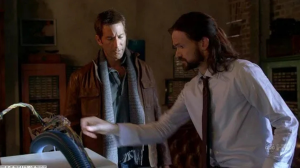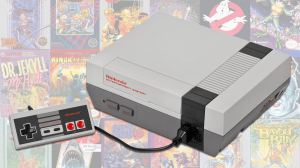One of the most iconic figures in all of fiction is Robin Hood, a character known for stealing from the rich to give to the poor, a notion of vigilante justice that dates back to the 13th century. The character has been explored in virtually every medium for centuries, though the division between the haves and the have-nots has only grown more disparate and exaggerated in recent years, with the figure serving less as a fable and more as inspiration for the current generation and their feelings of disenfranchisement. This concept is explored in the new film Echo Boomers, which hits select theaters, On Demand, and Digital HD on November 13th.
Videos by ComicBook.com
In the film, which is based on a true story, a group of young thieves breaks into some of the wealthiest homes in Chicago to rob them of their most valuable possessions, allowing them to secure wealth from those they feel don’t deserve it.
ComicBook.com recently caught up with the film’s stars Michael Shannon and Jacob Alexander to talk the film’s timely message, bringing the story to life, and the Kryptonian defibrillators.

ComicBook.com: So, first of all, Michael, Take Shelter is incredible. I just feel like you should hear that on a daily basis, if you don’t already.
Michael Shannon: Oh, thank you.
And you also really strike me as a guy who doesn’t mince words. So I hope you don’t mind me starting off with a pretty heavy subject…
Shannon: Okay.
What is the best Chicago pizza?
Shannon: You’re funny. The best kind of pizza? Oh, my God.
I’m not holding back.
Jacob Alexander: That’s hard.
Shannon: You know who I liked? And this is not going to be popular, but I was an Edwardo’s fan.
Alexander: Edwardo’s was great.
Shannon: It was just a little less … Giordano’s, Lou Malnati’s, and Gino’s East and all that can be a little full-on sometimes. I always felt like, with Edwardo’s, it was kind of the slightly healthier pizza.
Alexander: I saw that one in Skokie when I was growing up, that was a while back. Pequod’s was great. If you’re going to come to Chicago you should go to Pequod’s, it is pretty solid too.
I lived in Chicago for about a decade so Pequod’s is typically my go-to when I visit.
Shannon: I used to go to Barry’s for a slice. I used to really like Barry’s. That up in, it’s just south of Rogers Park. I don’t even know what you call that area, Edgewater or something.
I appreciate you guys setting the record straight. I don’t mean to start off so heavy.
Shannon: Yeah, man. I gotta sit down.
So to talk about the film we’re here for, Echo Boomers is Seth Savoy’s feature-film debut. What was it about the project or about Seth himself that made you guys willing to get involved with his first feature?
Alexander: I really liked the script. I had read it a while before, maybe about two years before I actually auditioned for the role. And I had met Seth not too far after I read the script and I just liked his demeanor. He was a calm guy. He knew what he was talking about. I trusted his vision just based off of the way he carried himself. And when we were working together, he proved exactly that. And it was great. There was a lot of pressure getting that project done, but he really held it together really well. It was great.
Shannon: It was a roller coaster trying to get this gone. Byron Wetzel is one of the main producers on it and he’d get it, it comes together, goes away, come together, goes away. These films, I don’t think people realize, I hope they appreciate, if you dig the movie, you appreciate just how hard it is to get to these low-budget indies off the ground. It’s kind of mind-boggling. I don’t know why it’s almost harder to get a small amount of money than it is to get like a hundred million dollars. Just ’cause the bigger budget films tend to be more instantaneously recognizable as crowd-pleasers, while a lot of these smaller films, they can be difficult. They can be uncomfortable, sometimes, to watch.
And a studio like Warner Bros. can say, “Oh, you only need $70 million? Sure, here you go.” But a smaller producer for an indie movie will have a harder time finding even a few hundred thousand dollars.
Shannon: Yeah, exactly. And, I get it, I mean, dang, I don’t know. I don’t think I would do that. I don’t think I’d put that money in, you know? But they say, “If you like the restaurant, don’t look in the kitchen.” I’ve been looking in the kitchen. I don’t think I could eat at that restaurant, if you get my meaning.
Hey, we started with pizza, so it’s all coming together.
Shannon: It’s all about food, this culinary issue with ComicBook.com.
This movie definitely feels very timely. These are issues of the haves and the have-nots. These are timeless issues, but it’s explored in a more specific way for our current culture. Between not only the characters that you playing in the film but also your own personal upbringing, what was it about this story that personally resonated with you?
Alexander: There’s an appeal to playing the bad guy. Man, who doesn’t want to be the badass breaking things in people’s houses? We are talking about the reference of Robin hood and everything, and that’s such an iconic character. The symbol of that and what they stand for. How do you not want to be that?
Shannon: I have to admit that I spent a couple of years living on the North Shore of Chicago up in Wilmette and I would see these communities up there, Kenilworth, Winnetka, these places of extreme wealth and a very insulated, kind of like utopian life. When you look at other parts of Chicago, like the South Side or West Side, where people are struggling to get by and these people with their money, they just build this wall around themselves and just avoid all the unpleasantness of life. I just really, for better or worse, and I’m not advocating for what these kids do, I don’t think it’s going to necessarily solve any problems, but there is something tasty about just seeing them stick it to some of these people. And it’s just something, I don’t know, it’s cathartic.
Similar to Steve McQueen’s Widows, a story that feels specifically from Chicago in the ways it depicted the cultural divides, racial divides, political divides, and financial divides, Echo Boomers feels uniquely Chicago. With you guys being from the Chicago area, other than the true story behind it, why do you guys think the story is something specific to Chicago?
Shannon: I just don’t know other cities as well. I mean, I’m sure it’s a dichotomy that exists in probably every major city in America, but I don’t know. I don’t know the geography of these cities. I don’t know, I wouldn’t know the names of what neighborhood is what. I just don’t know. But I know Chicago like the back of my hand. I’ve lived all over that city, North Side, Pilsen, West, by the lake, all over the place. So it was exciting. It’s exciting when you get to see that translate to the big screen, manifest on a big screen.
Alexander: Especially when it’s your home, like your home city. I’m pretty sure the actual story of the people that break into the houses, it was happening in Barrington, I believe. So, close, pretty relative to what you were just talking about, houses in the woods.
Jacob, you talked about how fun it was to smash things for certain scenes, you get to have wild parties in some scenes, you have intense arguments with Michael’s character in some scenes. Was there a particular favorite scene to shoot?
Alexander: I loved smashing the furniture, but the best, I think one of the best nights we had is when we went to Los Angeles and filmed the nightclub scenes. We had a lot of fun in those scenes. Those were long, long days, but we were having a lot of fun. The dancing scenes.
Shannon: Well, you were actually doing drugs.
Alexander: [laughs] We’re actually doing drugs. So hey, what do you know?
Shannon: Hey, you were supposed to say the day that I came to set.
Alexander: It was great too. But the drugs, man.
Shannon: But the drugs, yeah.
Alexander: Working with Mike is always great, that was great.
Shannon: But not as great as drugs, apparently.
Alexander: Not as good as drugs in Los Angeles.
Well, this is a good segue, not because it’s about drugs, but about working with Michael. He has a track record of being pretty intense in movies, despite being pretty far from those personas in real life. What’s it like having him yell at you for a movie? Does he instantly turn it on, palling around one minute and frightening the next, or does he stay in those characters for longer periods of time to create that mood?
Alexander: I don’t know if it’s about being in character, but I’ve seen Michael in rehearsals, in theater, and it’s all focus. The energy that he brings to a set is really something I can’t describe in words, but it’s really special being around him when he’s in his element. And I’ve been fortunate enough to work with him when he was directing a project we worked on, at the Red Orchid, here in Chicago, and he just brings this intensity and tacit into his work. It’s really something that people need to experience and be around. And I was scared. I mean, I’ve known Mike for a while. We worked together and I consider Mike my mentor and a close friend, but I was, I’m not going to lie, I was pretty nervous to be opposite him on screen, ’cause I had never done that before.
Shannon: Is “scissor fingers” in the movie?
Yes.
Shannon: Okay, I haven’t seen it yet.
Well, and it’s funny, you say “scissor fingers” and I know exactly that you’re talking about a pretty uncomfortable physical moment you have during a tense scene. I wondered if this “scissor fingers” moment was there in the script or if that was something improvised while shooting?
Alexander: It just kind of happened.
Shannon: It just happened once. It’s not on the script.
Alexander: That was one take and then the scissor fingers happened after that. The scissor fingers made the cut.
Shannon: Oh wow. No pun intended.
Michael, you’ve shown your support a lot for Zack Snyder over the years and they have been making a lot of announcements about his new Justice League project, revealing that Jared Leto would be back to shoot some things. If Zack calls you up and says they need Zod to show up in it, do you wish him luck or are you on the next plane to start shooting?
Shannon: Oh, I’d love to work with Zack again. I loved doing [Man of Steel]. It was a special experience. I felt very fortunate that he called me to do it in the first place. I haven’t heard anything. I don’t know. I always tell people I’m dead. Zod’s dead, he’s dead. Unless you got a defibrillator or something, I don’t really see it happening. But, I love Zack and I’m happy for him, that he’s getting to do that.
Well, if I hear of any Kryptonian defibrillators, I’ll make sure to let you know.
Shannon: I don’t know exactly where to send it, but I guess send it to him. Maybe they got it on QVC.
*****
Echo Boomers hits select theaters, On Demand, and Digital HD on November 13th.








